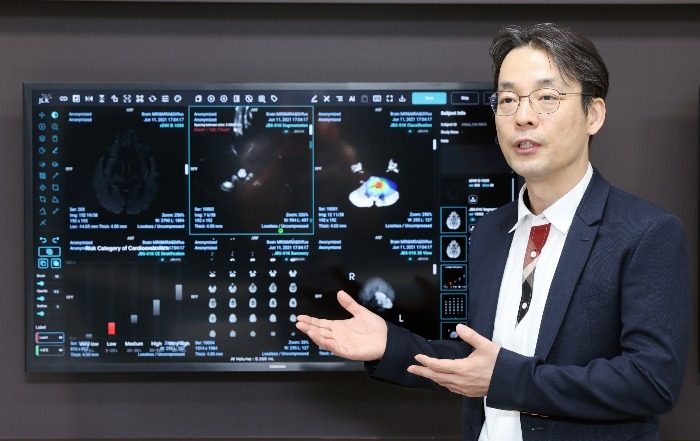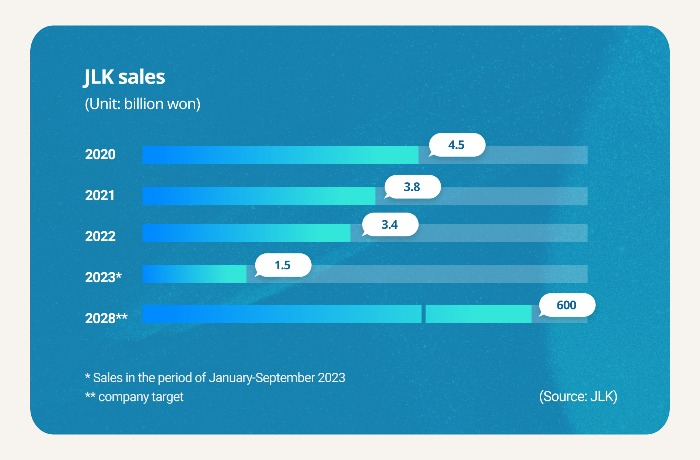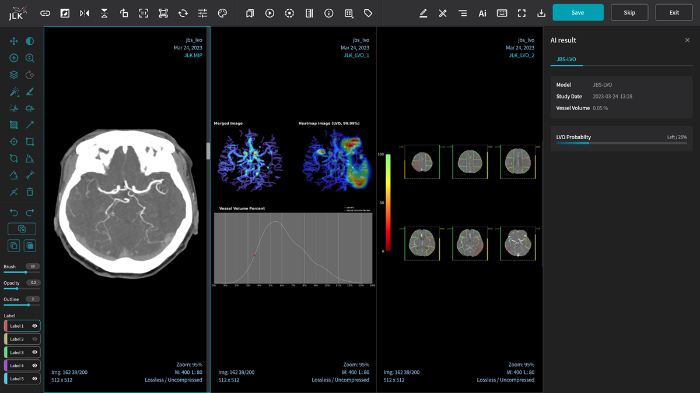Bio & Pharma
Korea's JLK targets AI-based stroke care market in US
It aims for more than 10% market share in the US, equaling the combined market share of RapidAI and Viz.ai
By Jan 10, 2024 (Gmt+09:00)
2
Min read
Most Read
LG Chem to sell water filter business to Glenwood PE for $692 million


Kyobo Life poised to buy Japan’s SBI Group-owned savings bank


KT&G eyes overseas M&A after rejecting activist fund's offer


StockX in merger talks with Naver’s online reseller Kream


Mirae Asset to be named Korea Post’s core real estate fund operator



South Korea’s JLK Inc., an AI-based stroke care platform maker, will go all out to build its foothold in the US this year, aiming to lift its sales by more than 150-fold to 600 billion won ($454 million) by 2028, its chief executive said.
Founded in 2014, the company offers 11 types of AI-enabled stroke solutions that manage the entire cycle from stroke treatment decisions to prognosis prediction. It is the largest number of such AI stroke solutions provided by a single company in the world.
A stroke, sometimes called a brain attack, occurs when a cerebral blood vessel bursts or something blocks blood supply to part of the brain.
The global market for stroke detection and treatment is estimated at $41 billion.
Kim Dong-min, chief executive of JLK, said on Tuesday the time is ripe for its foray into the US, where its competitors RapidAI and Viz.ai have supplied AI-powered stroke care platforms to 1,600 and 1,200 hospitals and imaging centers, respectively.
Their market shares are 5.6% and 4.2% in the US, respectively.

A rival AI stroke platform, identical to JLK's “LBS-LVO,” posted an 11-fold surge in sales after it was designated as an eligible beneficiary of the New Technology Add-on Payment (NTAP) in the US.
Under the system, the US government health insurance program Medicare pays for inpatients’ additional medical treatment using qualifying new technologies.
“We will supply our stroke AI solutions to about 3,000 US medical institutions and secure more than 10% of the US market,” he said at its 2024 Vision Declaration Ceremony on Tuesday.
Stroke patients are required to undergo various magnetic resonance image (MRI) scans, a longer process than for those with other diseases.
JLK’s AI platforms analyze cerebral hemorrhage and cerebral infarction ranging from hyperacute to severe, and predict the type of stroke and prognosis, based on the patient's MRIs and computed tomography (CT) images.

“It usually takes 110 to 160 minutes for a stroke patient to get to the emergency room, take image scans and begin the treatment procedure,” Kim said. “Using JLK’s solutions, this can be reduced to 80 minutes.”
JLK’s flagship product, “JBS-01K,” checks whether lesions have occurred in patients with cerebral infarctions and categorizes the type.
The product was recognized as the first innovative medical device among AI stroke care tools by the Ministry of Food and Drug Safety in South Korea.
It was also approved for use at medical institutions with no insurance coverage. It costs 54,300 won per use on average.
“In the past 10 months since February last year, 210 clinics and hospitals (in South Korea) have adopted JLK's solutions,” the CEO said.
“Our goal is to increase our domestic market share from the current 56% to 85% by 2028.”
Write to Ye-Na Kim at yena@hankyung.com
Yeonhee Kim edited this article.
More to Read
Comment 0
LOG IN



